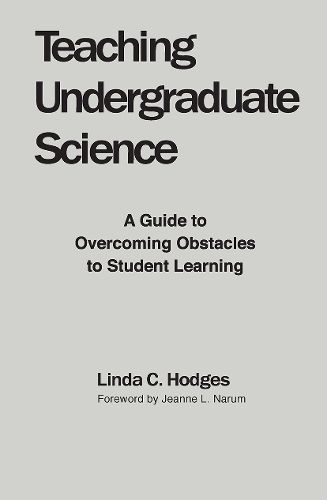Readings Newsletter
Become a Readings Member to make your shopping experience even easier.
Sign in or sign up for free!
You’re not far away from qualifying for FREE standard shipping within Australia
You’ve qualified for FREE standard shipping within Australia
The cart is loading…






This book, written by a scientist with experience of teaching undergraduates, is addressed to science and engineering faculty who feel frustrated about getting their students to engage and learn and who are looking for new ways to make their time in the classroom both more productive and enjoyable.
Linda Hodges reviews the various learning problems endemic to teaching science, explains why they are so common and persistent, and presents a digest of key ideas and strategies to address them, based on the research she has undertaken into the literature on the cognitive sciences and education, first as a teacher and subsequently as the director of faculty development programs.
Recognizing that faculty have different views about teaching, different comfort levels with alternative teaching approaches, and are often pressed for time, Linda Hodges takes these constraints into account by first offering a framework for thinking purposefully about course design and teaching choices, and then providing a range of strategies to address very specific teaching barriers - whether it be students’ motivation, engagement in class, their reading comprehension, laboratory, research or writing skills.
Except for the first and last chapters, the other chapters in this book stand on their own (i.e., can be read in any order) and address a specific challenge students have in learning and doing science. Each chapter summarizes the research explaining why students struggle and concludes by offering several teaching options categorized by how easy or difficult they are to implement. Some, for example, can work in a large lecture class without a great expenditure of time; others may require more preparation and adopting a more adventurous approach to teaching. Each strategy is accompanied by a table categorizing its likely impact, how much time it will take in class or out, and how difficult it will be to implement.
As a quote attributed to former aerospace engineer turned teacher, Ryan Fuller, says, Teaching isn’t rocket science; it’s harder. Linda Hodges’ message is that with intentional thought and a bit of effort we can succeed in helping many more students gain exciting new skills and abilities, whether they are potential scientists or physicians or entrepreneurs. Her book serves as a mini compendium of current research as well as a protocol manual: a readily accessible guide to the current research, the best practices known to date, and a framework for thinking about teaching.
$9.00 standard shipping within Australia
FREE standard shipping within Australia for orders over $100.00
Express & International shipping calculated at checkout
This book, written by a scientist with experience of teaching undergraduates, is addressed to science and engineering faculty who feel frustrated about getting their students to engage and learn and who are looking for new ways to make their time in the classroom both more productive and enjoyable.
Linda Hodges reviews the various learning problems endemic to teaching science, explains why they are so common and persistent, and presents a digest of key ideas and strategies to address them, based on the research she has undertaken into the literature on the cognitive sciences and education, first as a teacher and subsequently as the director of faculty development programs.
Recognizing that faculty have different views about teaching, different comfort levels with alternative teaching approaches, and are often pressed for time, Linda Hodges takes these constraints into account by first offering a framework for thinking purposefully about course design and teaching choices, and then providing a range of strategies to address very specific teaching barriers - whether it be students’ motivation, engagement in class, their reading comprehension, laboratory, research or writing skills.
Except for the first and last chapters, the other chapters in this book stand on their own (i.e., can be read in any order) and address a specific challenge students have in learning and doing science. Each chapter summarizes the research explaining why students struggle and concludes by offering several teaching options categorized by how easy or difficult they are to implement. Some, for example, can work in a large lecture class without a great expenditure of time; others may require more preparation and adopting a more adventurous approach to teaching. Each strategy is accompanied by a table categorizing its likely impact, how much time it will take in class or out, and how difficult it will be to implement.
As a quote attributed to former aerospace engineer turned teacher, Ryan Fuller, says, Teaching isn’t rocket science; it’s harder. Linda Hodges’ message is that with intentional thought and a bit of effort we can succeed in helping many more students gain exciting new skills and abilities, whether they are potential scientists or physicians or entrepreneurs. Her book serves as a mini compendium of current research as well as a protocol manual: a readily accessible guide to the current research, the best practices known to date, and a framework for thinking about teaching.